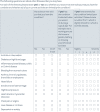Comorbidities are associated with poorer quality of life and functioning and worse symptoms in the 5 years following colorectal cancer surgery: Results from the ColoREctal Well-being (CREW) cohort study
- PMID: 30070052
- PMCID: PMC6221152
- DOI: 10.1002/pon.4845
Comorbidities are associated with poorer quality of life and functioning and worse symptoms in the 5 years following colorectal cancer surgery: Results from the ColoREctal Well-being (CREW) cohort study
Abstract
Objective: More people are living with the consequences of cancer and comorbidity. We describe frequencies of comorbidities in a colorectal cancer cohort and associations with health and well-being outcomes up to 5 years following surgery.
Methods: Prospective cohort study of 872 colorectal cancer patients recruited 2010 to 2012 from 29 UK centres, awaiting curative intent surgery. Questionnaires administered at baseline (pre-surgery), 3, 9, 15, 24 months, and annually up to 5 years. Comorbidities (and whether they limit activities) were self-reported by participants from 3 months. The EORTC QLQ-C30 and QLQ-CR29 assessed global health/quality of life (QoL), symptoms, and functioning. Longitudinal analyses investigated associations between comorbidities and health and well-being outcomes.
Results: At baseline, the mean age of participants was 68 years, with 60% male and 65% colon cancer. Thirty-two per cent had 1 and 40% had ≥2 comorbidities. The most common comorbidities were high blood pressure (43%), arthritis/rheumatism (32%), and anxiety/depression (18%). Of those with comorbidities, 37% reported at least 1 that limited their daily activities. Reporting any limiting comorbidities was associated with poorer global health/QoL, worse symptoms, and poorer functioning on all domains over 5-year follow-up. Controlling for the most common individual comorbidities, depression/anxiety had the greatest deleterious effect on outcomes.
Conclusions: Clinical assessment should prioritise patient-reported comorbidities and whether these comorbidities limit daily activities, as important determinants of recovery of QoL, symptoms, and functioning following colorectal cancer. Targeted interventions and support services, including multiprofessional management and tailored assessment and follow-up, may aid recovery of health and well-being in these individuals.
Keywords: cancer; colorectal cancer; comorbidities; health and well-being; longitudinal; oncology; quality of life; survivorship.
© 2018 The Authors. Psycho-Oncology Published by John Wiley & Sons Ltd.
Figures
References
-
- GLOBOCAN . Estimated cancer incidence, mortality and prevalence worldwide in 2012. http://globocan.iarc.fr/Pages/fact_sheets_cancer.aspx.
-
- NCI . National Cancer Institute. Cancer Stat Facts: Colon and Rectum Cancer 2016.
-
- ONS . Office for National Statistics. Cancer survival in England: patients diagnosed between 2010 and 2014 and followed up to 2015. Available from: https://www.ons.gov.uk/peoplepopulationandcommunity/healthandsocialcare/..., 2016.
-
- Feinstein AR. The pre‐therapeutic classification of co‐morbidity in chronic disease. J Chronic Dis. 1970;23(7):455‐468. - PubMed
Publication types
MeSH terms
LinkOut - more resources
Full Text Sources
Other Literature Sources
Medical


